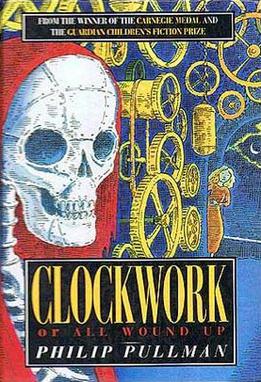Clockwork (novel) facts for kids

First edition (UK)
|
|
| Author | Philip Pullman |
|---|---|
| Illustrator | Peter Bailey |
| Country | United Kingdom |
| Language | English |
| Genre | Children's novel |
| Publisher | Doubleday |
|
Publication date
|
1996 |
| Media type | |
| Pages | 92 pp |
| ISBN | 0-385-40755-6 |
| OCLC | 36964106 |
Clockwork, or All Wound Up is a short, exciting children's book written by Philip Pullman. It was first published in the United Kingdom in 1996. The book is special because it has many cool illustrations.
It was nominated for two big awards: the Whitbread Children's Book Award and the Carnegie Medal in 1997. This shows how popular and well-liked the book was!
Philip Pullman shared that he got the idea for Clockwork from an old clock he saw at the Science Museum in London. He noticed how the clock's gears moved in different directions. This inspired him to write a story where events also move in surprising and opposite ways.
Contents
The Story of Clockwork
Clockwork takes place in a charming old German town called Glockenheim. The story is set "in the old days." It follows three main characters whose lives become tangled together.
Meet the Characters
- Karl: He is an apprentice clockmaker. Karl is worried because he hasn't finished the special figure for the town clock. This is a big problem because no apprentice has ever failed before!
- Gretl: She is a very kind and selfless young girl. Gretl is the daughter of the innkeeper in Glockenheim.
- Fritz: He is a local writer. Fritz's unfinished story is what really gets the "gears" of Clockwork turning.
A Night at the Tavern
The townspeople gather at the White Horse Tavern. It's the night before Karl's new clock figure is supposed to be revealed. Karl tells Fritz his secret: he hasn't made the figure.
Everyone in the tavern listens as Fritz reads from his newest story. It's about a local aristocrat, Prince Otto, and his young son, Prince Florian. In the story, Prince Otto dies during a hunting trip. But his heart has been replaced with a clockwork machine! This allows him to drive his son home in their sledge.
Fritz wrote this story after having a dream. However, he hasn't thought of an ending for it. He hopes to make one up as he reads. He says he will "wind up the story, set it going, and make up the end when he got there."
Mysterious Gifts and Dangers
Suddenly, the mysterious Dr. Kalmeneius arrives at the tavern door. Fritz gets scared and runs away. Dr. Kalmeneius offers Karl a clockwork figure named Sir Ironsoul. Karl accepts this strange gift.
Accepting Sir Ironsoul starts a chain of connected events. There's a hidden cost to this gift. Sir Ironsoul is a mechanical knight who comes alive! He kills anyone who says the word "Devil." Only a special song called "The Flowers of Lapland" can stop him.
The Clockwork Prince
The story jumps back and forth in time. We learn that Prince Florian was actually made from clockwork by Dr. Kalmeneius. This was done because his father wished for it. Prince Florian's mechanical heart will soon stop working.
Gretl is the only person who can bring true life back to Prince Florian. All the different stories start to come together. Karl places Prince Florian in the clock's tower as his apprentice piece. Sadly, Karl is then killed by Sir Ironsoul.
But the story isn't over. Gretl finishes the journey. She brings Prince Florian to life through her selfless love.
Stage Adaptation
Clockwork has also been turned into a musical! It has music by Stephen McNeff and a story (called a libretto) by David Wood.
This musical version toured around the United Kingdom. It then played at the Linbury Studio Theatre in London's Royal Opera House in March 2004. Musicians from the Philharmonia Orchestra played for the show.
 | Selma Burke |
 | Pauline Powell Burns |
 | Frederick J. Brown |
 | Robert Blackburn |

